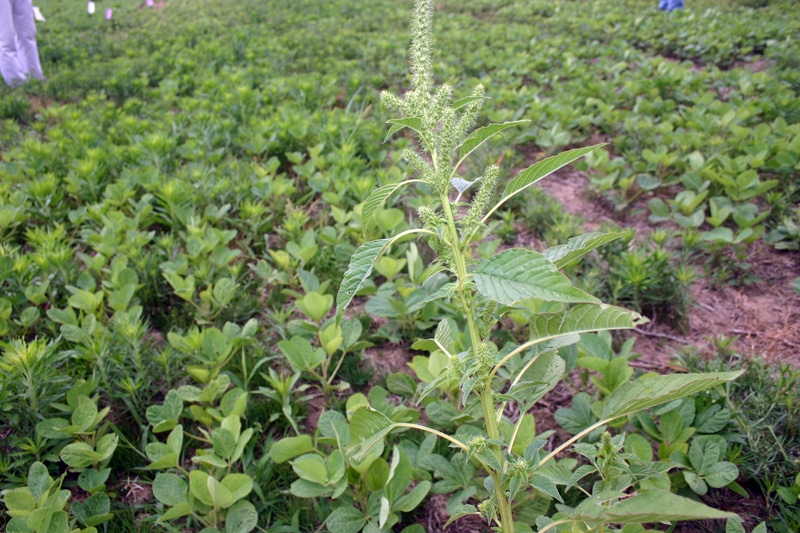August 15, 2013

If we cannot turn the corner from reactive to proactive weed management we will lose the battle against glyphosate-resistant weeds.
Overall 2013 Arkansas crops look better from a pigweed standpoint. We have had favorable moisture for residual herbicides in a lot of areas. I do not see nearly as many grown-up messes, but far too many of our cleaner fields have escapes in them. This means that even though yields will not be reduced, we continue to replenish the soil seedbank.
If the field is a Roundup Ready field, the pigweeds have been pounded with PPO-inhibiting herbicides like Flexstar and UltraBlazer. If one of those escapes happens to be resistant, then you are on the way to losing the PPO technology. If the field is a LibertyLink field, the pigweeds likely have been pounded with Liberty. Right now there has been no documented pigweed resistance to Liberty. However, if we put only the LibertyLink technology in the worst fields, pound the pigweeds with Liberty and allow escapes, resistance will surely happen.
4 reasons pigweeds won this year
The science behind rotating technologies is to control any resistant escapes before the soil seed banks can build.
While a lot of farmers have really stepped up the game, far too many remain in denial. I am a very frustrated weed scientist. I get calls from a lot of frustrated consultants. One recent telephone conversation sticks out in particular. The consultant called and said, “I thought this soybean consulting thing would be much easier than rice, but boy was I ever wrong! I couldn’t get my farmers to include LibertyLink soybeans in their crop mix for a multitude of reasons.
“I could not get them to use residuals because they either didn’t feel they had time or didn’t figure they would work. They couldn’t get their postemergence herbicides applied timely because the applicators were overbooked. Now they have pigweeds everywhere — even in fields where they have never had them before and guess who gets the blame?”
In his frustration he commented, “I am tempted to go to go to $20 per acre for soybean scouting and hope I don’t get a single acre!”
Like me, he will get over his frustration at some point. However, winning the pigweed fight is going to take a diverse crop mix, sometimes some tillage diversity, judicious use of residual herbicides, a mix of Roundup Ready and LibertyLink technologies, and hand-weeding escapes. If someone has an easier answer, I need to be brought up to speed.
Ag news delivered daily to your inbox: Subscribe to Delta Farm Press Daily.
My frustration is not with farmers but rather with a lot of the information farmers are given. I can’t tell you how many times on train-wreck calls this summer I have thought, “I wonder what the person who told you that program would work to start with would recommend now?” That is no criticism, but the industry must get on the same page on what is required to win this fight, and do it in the farmers’ best interest.
I am concerned that many feel the new technologies- 2,4-D-, dicamba- and HPPD-tolerant crops represent the easy answer. While I wish that were true, I believe we have two foundation herbicides — glyphosate (Roundup) and glufosinate (Liberty). Stacking these new traits with Roundup and/or Liberty will greatly increase the utility of the foundation herbicides. However, 2,4-D, dicamba, and the HPPD herbicides are not foundation herbicides by themselves. Unless we can save what is left of glyphosate and save all of glufosinate, these new traits will be beat before they get started. We must have proactive diversity now.
Also:
Palmer pigweed - it's all about timing
Pigweeds, drift hit Arkansas fields
About the Author(s)
You May Also Like




